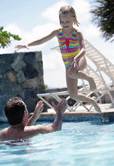
THURSDAY, May 20 (HealthDay News) — Released just before the start of summer, a new government report finds that many public pools that are open to swimmers should not be, due to the presence of disease-causing germs.
Public pool inspections in 13 states resulted in the closure of about one in eight because of serious violations that could cause bathers to get sick, according to a study released Thursday by the U.S. Centers for Disease Control and Prevention.
Child-care facility pools (17.2 percent), hotel/motel pools (15.3 percent) and apartment/condo pools (12.4 percent) were most likely to require immediate closures, according to the report published in the May 20 issue of the CDC’s Mortality and Morbidity Weekly Report.
Studying data on more than 121,000 routine pool inspections, researchers found the highest percentage of disinfectant violations in kiddie/wading pools (13.5 percent) and interactive fountains (12.6 percent). Improper disinfectant procedures and pH levels can lead to the transmission of gastroenteritis-causing germs, such as the Shigella and norovirus germs.
“Pool inspections are vital to helping state and local government pool programs keep swimmers healthy and safe, but pool inspectors can’t be at every pool every day. It’s important for people to play an active role in protecting their own health when they swim,” Michele Hlavsa, chief of the Healthy Swimming Program at CDC, said in a CDC news release. “By working together, we can decrease the risk of illness and make sure swimming is not only fun, but healthy, too.”
The CDC recommends that swimmers educate themselves about recreational water illnesses and follow these six healthy-swimming guidelines:
- Don’t swim if you have diarrhea.
- Avoid swallowing pool water.
- Before swimming, shower with soap and wash your hands so that germs on your body don’t end up in the water. Wash your children, especially around the derriere.
- Check your children’s diapers often, and provide frequent bathroom breaks for older kids.
- Change diapers away from the pool area.
- Gauge the quality of pool water yourself with test strips sold at local stores.
Ask your pool operator for information on chlorine and pH levels and the latest pool inspection score. The pH should be tested and adjusted weekly. Encourage pool operators to take steps necessary for healthy swimming.
The CDC’s tips are presented in recognition of Recreational Water Illness Prevention Week, which starts May 24.
More information
For more on swimming pool safety, see Nemours Foundation.

